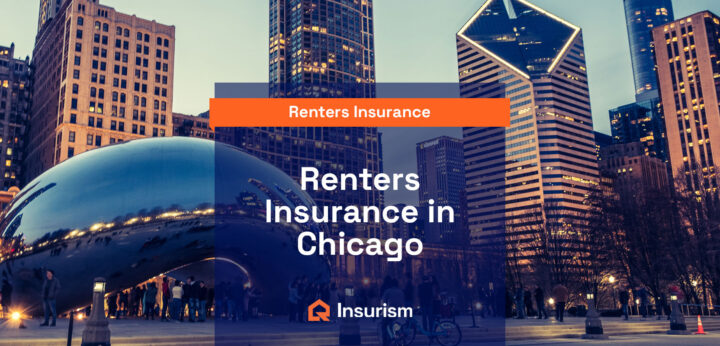Table of Contents
- How much does renters insurance cost in Chicago?
- Average price of renters insurance in Chicago by insurer
- The cheapest renters insurance in Chicago: Lemonade
- The best renters insurance in Chicago: Liberty Mutual
- Other Chicago renters insurance providers to consider
- Learn more about renters insurance providers in Chicago
- What else should you know about renters insurance in Chicago?
- How we gathered our data on Chicago renters insurance prices
How much does renters insurance cost in Chicago?
The average price of renters insurance in Chicago is $19.63 per month. This makes it the most expensive city for renters insurance in Illinois, which has a statewide average of $16.41 per month. While Chicago’s renters insurance prices might be the steepest in the state, they’re still below the national average of $20.00 per month.
The cheapest provider we found in the city was Lemonade, with policies as cheap as $11.09 per month, and the priciest company by far was Progressive, with policies costing $30.62 per month.
What factors affect the price of renters insurance in Chicago?
Insurance companies consider a variety of factors when determining your renters insurance premium (the price you pay each month).
One of the biggest factors is where you live. If you live in an area with a high crime rate, your premiums will be higher because renters insurance covers theft. Chicago’s property crime rate is above the statewide average, which partly explains the city’s higher renters insurance rates. However, if you live in safer areas like Lake View or Lincoln Park, your premiums might be cheaper.
You’ll also have to pay more for renters insurance if you live in an area that’s vulnerable to natural disasters like hurricanes or earthquakes. The main natural disasters that affect Chicago are floods, snowstorms, and windstorms. Since 1981, 99 of Illinois’s 102 counties have been declared natural disaster areas due to flooding. Moreover, the harsh winter conditions and storms that sometimes occur in the Windy City can cause frozen pipes or damage from wind, hail, snow, and lightning.
In addition to location, the following personal factors also affect the cost of renters insurance:
- Your chosen renters insurance deductible
- How much coverage you need
- Your insurance claims history
- Your credit score
Average price of renters insurance in Chicago by insurer
The table below lists the average monthly and yearly renters insurance prices offered by Chicago’s major insurance providers. You can also see how each insurer compares to the citywide average.
| Insurer | Price (monthly) | Price (yearly) | Difference from average |
|---|---|---|---|
| Allstate | $20.00 | $240.00 | +$0.37 |
| GEICO | $22.00 | $264.00 | +$2.37 |
| Progressive | $30.62 | $367.44 | +$10.99 |
| State Farm | $20.83 | $249.96 | +$1.20 |
| Liberty Mutual | $14.92 | $179.04 | -$4.71 |
| Nationwide | $15.23 | $182.76 | -$4.40 |
| Lemonade | $11.09 | $133.08 | -$8.54 |
The cheapest renters insurance in Chicago: Lemonade
The cheapest renters insurance in Chicago is offered by Lemonade. They charge $11.09 per month on average, which is just over half the city’s average cost.
Lemonade is cheap, but are you getting something good for that price? We break down Lemonade’s renters insurance below.
Benefits of Lemonade’s renters insurance in Chicago, IL
- Convenient digital services: If you prefer managing your policy and filing claims online, then you’ll like Lemonade’s digital approach. You can sign up for a policy and file claims using their website and mobile app, sparing you the hassle of speaking to an agent.
- Zero-deductible option: Your deductible is the out-of-pocket amount you have to pay when you file a claim. Lemonade is the only insurance provider that gives you the option of choosing a $0 deductible (and even they only offer this in Illinois and a handful of other states). In contrast, most other providers require you to pay a $250–$1000 deductible before your coverage kicks in and covers the rest of your claim.
- They donate some of your unused premiums: One of Lemonade’s most distinguishing characteristics is their promise to donate a portion of your monthly payments to a charity of your choice. This doesn’t affect the quality of your insurance, but it’s a nice perk for the socially conscious.
Disadvantages of Lemonade’s renters insurance in Chicago, IL
- Limited customer support: Lemonade’s digital business model has one major downside: getting an agent on the phone can be difficult, which is problematic if you have a complicated claim or a request that Lemonade’s app and website aren’t equipped to handle. This also means Lemonade isn’t the best choice if you’re someone who likes more personalized customer service.
- No coverage for power outages: Most renter insurance policies cover food loss due to power outages, but Lemonade’s policies don’t. Unless you have a generator, this is a major drawback considering the high risk of weather-related power outages in Chicago.
The best renters insurance in Chicago: Liberty Mutual
Our pick for the provider with the best renters insurance in Chicago is Liberty Mutual. Their policies offer the best coverage for Chicago residents and only cost $14.92 per month, which is well below the citywide average and the second-cheapest quote we got from all the city’s major insurers.
Advantages of Liberty Mutual’s renters insurance in Chicago, IL
- Optional flood insurance: Liberty Mutual is one of only three companies we looked at that can help you sign up for flood insurance through the National Flood Insurance Program (NFIP). Flood insurance is a must for all Chicago residents because renters insurance doesn’t usually cover floods, so if you get your renters insurance from another provider, you’ll have to sign up for flood insurance on your own.
- Numerous discounts: On top of their low prices, Liberty Mutual has a variety of discounts you can take advantage of, including discounts for going 5 years without filing a renters insurance claim, buying your policy online, switching from another provider, having multiple policies, and signing up for autopay.
Disadvantages of Liberty Mutual’s renters insurance in Chicago, IL
- Not very dog-friendly: Unlike USAA and State Farm, Liberty Mutual refuses to cover several dog breeds. This means that the pet liability insurance that comes with your renters insurance policy might not apply if your dog is a pit bull or another commonly blacklisted breed.
- Replacement cost coverage costs extra: Liberty Mutual’s renters insurance automatically comes with actual cash value coverage (which values your belongings as used items) instead of replacement cost coverage (which values your belongings as new items). If you want replacement cost coverage with Liberty Mutual, then you’ll have to pay a little extra.
Other Chicago renters insurance providers to consider
Even though Liberty Mutual is our pick for the best renters insurance provider in Chicago, we’ll also talk about some companies that may be a better fit for you if you’re:
- A military member or veteran
- A dog owner
- Retired
- A business owner
Best Chicago renters insurance for military members and veterans: USAA
USAA’s renters insurance is only available to military servicemembers, veterans, and certain family members (spouses and children) of other USAA policyholders. However, if you qualify, we strongly recommend USAA.
A basic USAA renters insurance policy includes flood and earthquake coverage at no additional cost. While you might not be too concerned about earthquakes if you live in Chicago, their flood coverage is a huge perk. In addition to their great coverage, USAA’s reputation for customer service is much better than that of many of their competitors.
Best Chicago renters insurance for dog owners: State Farm or USAA
Like we mentioned earlier, some providers aren’t ideal for people who have dogs of certain breeds. State Farm and USAA are currently the only renters insurance companies that won’t consider your dog’s breed when making a decision on whether they’re eligible for pet liability insurance (which covers dog bites and damage that your dog causes to other people’s property).
However, keep in mind that you may have a higher premium if you own a dog, and your dog might still be considered ineligible for coverage if they have a history of causing injuries.
Best Chicago renters insurance for retirees: Allstate
If you’re 55 years or older and you’re not currently working or seeking full-time employment, then you can get up to 25% off your renters insurance premium if you sign up for a policy with Allstate. This is a huge discount that most of Allstate’s competitors don’t offer.
Allstate provides solid coverage for Chicago residents of all ages (they’ll even help you sign up for flood insurance), and getting 25% off your policy could make them the cheapest insurance company for you if you’re eligible for their 55 and retired discount.
Best Chicago renters insurance for business owners: State Farm
State Farm offers the option to add business property coverage and incidental business liability coverage to your renters insurance. These add-ons may be particularly attractive to you if you run a business out of your home or you want protection in case you’re taken to court in a work-related lawsuit. In particular, this extra coverage extends to:
- Damage to your business equipment
- Loss of income if your business is forced to shut down due to a covered peril
- Professional liability lawsuit costs
- Personal property used for business purposes
Learn more about renters insurance providers in Chicago
If you’re still unsure which renters insurance provider is right for you, take a look at our in-depth reviews of major providers in Chicago:
What else should you know about renters insurance in Chicago?
Now you know which insurance providers offer the best deals in the city. However, there’s still a few things you should know about how renters insurance works in Chicago before you buy your policy:
Do landlords require renters insurance in Chicago?
Although renters insurance is not legally required in Chicago, your landlord does have the right to require you to get renters insurance before you move in. It’s legal for them to write this requirement into the lease.
Whether your landlord requires it or not, you need renters insurance. Some people think that their possessions will be covered by their landlord’s insurance, but landlord insurance generally only protects the structure of the building and their own property (e.g. appliances and furniture that they own), not your personal belongings.
If your things are damaged by a covered renters insurance peril, then your insurer will help pay to replace them as part of your personal property coverage. When you and your landlord have separate insurance policies, you can avoid potential disputes over who’s liable for covering a given loss.
Is a credit check required for renters insurance in Chicago?
Yes, your insurer will probably run a credit check when you buy renters insurance in Chicago. Like we mentioned earlier, your credit score is one of the factors that determine the monthly cost of your renters insurance, with higher credit scores meaning lower premiums and vice versa.
If you don’t have a high credit score, then don’t worry. There are still several ways you can lower your premiums, which we go over in our article on whether you can get renters insurance with no credit check.
Does renters insurance cover tornadoes and storms?
Yes, renters insurance covers windstorms and tornadoes. Your renters insurance policy will also cover snow and ice damage, water damage from frozen pipes, as well damage caused by lightning, all of which are fairly common in Chicago.
Where do I get flood insurance?
You have two options for getting flood insurance: you can add a flood endorsement or rider to your renters insurance policy, or you can buy a separate flood insurance policy. If your insurer doesn’t offer any type of flood coverage, then you should find an agent who can get you an NFIP policy.
Experts think that flooding in Chicago will become increasingly common in the coming years, and floodwater can cause severe damage to your personal belongings. For these reasons, we highly recommend getting flood insurance if you live in Chicago.
How we gathered our data on Chicago renters insurance prices
We obtained quotes from 9 of Chicago’s major insurance providers to find out the average price of renters insurance in the city. We obtained our quotes based on the following profile:
- Insured party: 30-year old male, employed, unmarried, with no pets
- Personal property coverage: $30,000
- Personal liability coverage: $100,000
- Guest medical coverage: $1,000
- Loss-of-use coverage: Insurer’s default (usually based on personal property coverage)
- Deductible: $500
Your demographics and the amount of coverage you choose will affect your premiums, so you’ll receive different quotes if your profile is different from the one we used. Also note that our prices don’t factor in installation fees or down payments. However, there are some simple ways you can get renters insurance with no down payment.
Related Questions
- What is guest medical coverage in renters insurance?
- What is a sub-limit in renters insurance?
- Does renters insurance cover home-based businesses?
- Does renters insurance cover gold or silver bullion?
- What does "dependent in the care of" mean in renters insurance?
- Does State Farm renters insurance cover hotel stays?






